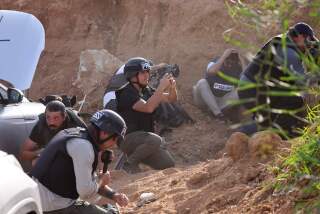Distortion, at Home and Abroad : Propaganda: By manipulating CNN, Iraq’s dictator tries to undermine America’s faith in its press.
Peter Arnett is scooping the world with exclusive coverage of Baghdad under fire. Stay tuned for the controversy immediately following these CNN broadcasts. Just as there has never before been “real time” war reporting, neither has any news organization faced double, ongoing censorship from friend and foe.
Some issues:
-- Does the journalistic duty to inform include transmitting enemy propaganda in wartime?
-- Do Arnett’s reports add information vital to the American public, or its military?
-- CNN’s unprecedented invitation to remain in Baghdad attests to an ascendant role worldwide. But is its primary obligation global (Iraq included) or American?
Americans largely trust the news media. Arnett walking us around a bombed “baby milk plant” packs a large emotional wallop, forcing the United States onto the defensive. The same sequence from Iraqi television would be dismissed.
Arnett’s cues to Iraqi manipulation and CNN’s careful disclaimers raise a difficult question. If he doesn’t believe something, and can’t say so, why show it?
Truth is often listed as “the first casualty” of war. Saddam Hussein has targeted a second: public confidence in American news organizations. Far beyond being the media’s greatest asset, its credibility is a key bond holding the country together.
There are 700 American reporters in Saudi Arabia subject to U.S. security review and one in Iraq who isn’t, because nobody envisaged the equivalent of broadcasts from Berlin, complete with Adolf Hitler interviews. Unless the intelligence value of Arnett’s reports outweigh the security risks that justify the U.S. censorship system--and may--logic lumps CNN’s Baghdad bureau with the rest of the American news media in the war zone.
Twenty-four years ago, Marshall McLuhan predicted a “global village” of mass communication. Now that it’s here, and at war, the instinct to equate CNN’s scoop with great journalism needs to be evaluated in light of certain village realities: The U.S. military is under tremendous pressure to avoid misleading the American public through the media. Saddam Hussein’s agenda is quite different.
More to Read
The biggest entertainment stories
Get our big stories about Hollywood, film, television, music, arts, culture and more right in your inbox as soon as they publish.
You may occasionally receive promotional content from the Los Angeles Times.










